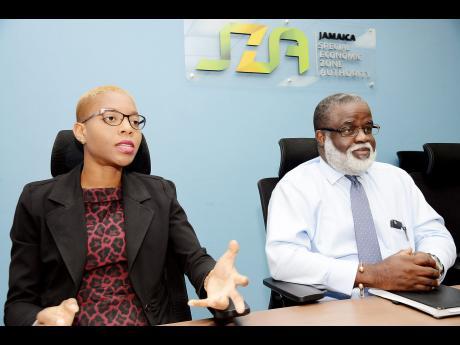The fairly newly minted Jamaica Special Economic Zone Authority, JSEZA, is in the international market to tap billions of dollars in multilateral development financing for local businesses it is trying the lure into setting up mega enterprises in stand-alone economic zones.
It is also celebrating the more than $3 billion in local and international investments it has attracted since the special economic zone regime was formalised with the promulgation of the Special Economic Zones Act two years ago.
Chief Executive Officer Eric Deans says his organisation is now in talks with funding agencies, including the Caribbean Development Bank, CDB, and International Finance Corporation, the private sector funding arm of the World Bank.
“We are trying to be innovative in terms of financing. It is unlikely that we will find many persons in Jamaica with the amount of capital readily available to invest, so we are looking at creating equity funds, where a pool of funds will be created that Jamaican firms can access to allow them to participate in these types of joint ventures and use the revenues from the joint ventures to repay (the loans),” Deans told the Financial Gleaner in an interview on Wednesday.
He is expected to carry his pitch for sustainable financing for special economic zone enterprises to the CDB officials when he addresses the CDB governors conference later this month.
This is part of the push by JSEZA to rely less on foreign investments to drive the zones and to create possibilities for more local firms to take up the tax-free incentives they offer. These include no duty on goods and zero general consumption tax on electricity and telephone calls.
The JSEZA is also in talks with energy providers to introduce liquified natural gas, or LNG, as well as renewable energy to reduce energy input for prospective investors, its CEO said.
Numbers growing
Deans pointed out that there are now some 190 free zone businesses across 12 parishes operating under the old regime. JSEZA is charged with transitioning these firms to the new special economic zone regime with a statutory deadline of December 31, 2019, to do so; attract and process new applications even as it ensures the overall governance, legislative and operational framework; and regulates all entities under the SEZ architecture.
SEZs in Jamaica include technology parks such as the Barnett Tech Park in Montego Bay, several business process outsourcing operations, the Kingston Container Terminal, Kingston Wharves, Walkers-wood Caribbean Foods agro-processing business in St Ann, a petrochemical manufacturing firm located in Old Harbour in St Catherine, and the Garmex industrial and commercial operation in Kingston.
The size of existing SEZs is fairly small and one of the preoccupations of the authority now is to encourage the scaling up of future investments to the mega developments being pursued elsewhere in the world, such as in China and Singapore, that includes large commercial, industrial, residential and recreational facilities in one location.
A typical SEZ in China is said to be around 400 square kilometres, whereas Jamaica’s largest SEZ, the Kingston Free Zone, is 19 acres or 0.076 square kilometres. JSEZA sees the joint-venture model as the best way of achieving the setting up of bigger zones in Jamaica.
Mega SEZs in the pipeline ,such as the planned 1,200 acres Caymanas zone in St Catherine, the 6,000-acre Jiuquan Iron and Steel Company industrial park for Nain in St Elizabeth, as well as the talked-about 4,000-acre Vernamfield airport city in Clarendon, are intended to be of the large scale contemplated.
The investments being hunted and promoted are expected to be multibillion-dollar enterprises which would dwarf the US$400 to US$600 million a year in investments Deans noted that Jamaica has attracted over the past 10 years.
The aim is to get closer to the US$1 billion to US$4 billion per year being raked in by Jamaica’s regional competitors, including Costa Rica, Colombia, Dominican Republic and to a lesser extent, Trinidad & Tobago and emerging Cuba.
The feasibility study for Caymanas is not expected to be completed until August this year, and Vernamfield is even farther off. Deans said requests for proposals will be invited from prospective investors immediately thereafter.
The timeline for Caymanas, he said, does not represent an unusually slow movement on the long-proposed project, as the concept has been radically changed from a real estate project selling lots to an integrated township develop-ment with commercial, industrial and residential components.
Deans pointed out that the take-up of SEZ opportunities by Jamaican businesses has been among the high points of the work of the authority to date. Kelli-Dawn Hamilton, director of investor relations and communication at JSEZA, said investors and business owners have been “very vocal” in their feedback.
This response has included opposition to the initially proposed flat fee-rate structure across the board for SEZ businesses. The revised fee structure is now based on square footage and is payable by the developers of SEZ space.
Even though the SEZ legislation replacing the old free zones act was passed in 2016, it wasn’t until late last year that the companion regulations needed to give effect to the law were out in place, giving the authority and its 12 staff the mandate to operate from its 13 Waterloo Road offices in St Andrew since January last year.
Deans, who is also the chairman of the Jamaica Logistics Hub Taskforce, is regarded in some circles as the principal technical architect of Jamaica’s logistics hub initiative. He is an associate professor in logistics and supply chain sustainability at the Caribbean Maritime University, CMU, serves as executive director of the CMU’s centre for sustainable supply chains, and was at one time Jamaica’s representative to the International Maritime Organization.
He is still gung-ho on the vast potential of Jamaica logistics initiative meant to capitalise of the country’s central location in the global goods-supply route to generate industry, jobs and economic growth.
In fact, former Trade and Investment Minister Anthony Hylton appears vindicated by the early success of the initiative he was famous for having trumpeted during past People’s National Party-led administrations to some scepticism.
Kingston Wharves’ successful total logistics centre, Deans said, scaled up from its initial plan as a result of the early success of the venture, buttressed by the incentives offered under the SEZ regime.
Source: http://jamaica-gleaner.com/article/business/20180504/jseza-hunts-funding-economic-zone-investments




